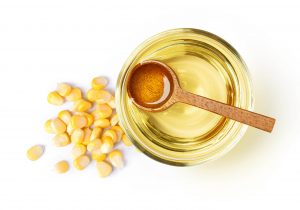
Understanding the negative effects of high-fructose corn syrup
Do you remember how the musical Mary Poppins sang that, “a spoonful of sugar helps the medicine go down”? Well, people are no longer singing its praises. Today, most health experts have soured on the idea of consuming too much sugar, but not all sugar is the same. There are actually several types of sugars, but one kind of processed sweetener known as high-fructose corn syrup has gotten a bad name—and has even been blamed for the nation’s obesity epidemic. Yet, many still wonder, is high-fructose corn syrup bad for you? It isn’t crystal clear. For the short and sweet of it, take a closer look at this controversial sweetener and the difference between high-fructose corn syrup and sugar. Then, get a taste of the foods and drinks full of high-fructose corn syrup, side effects of consuming too much, and tips on how to avoid high-fructose corn syrup that shouldn’t be taken with a grain of salt.
Sugar shock
Not all sugar is created equal. While some sugars are naturally found in wholesome foods like fruits, milk, and vegetables, these natural sugars are considered healthy additions to your diet. Concern arises from processed sugars that are added to many commercially prepared foods and beverages, such as sugary candies, sweet bakery treats, and syrupy sodas. One of the most common processed sugars is high-fructose corn syrup. The sweetener is made from corn starch that gets processed into corn syrup, which is a simple sugar known as glucose. Then, enzymes are added that convert some of the glucose into another type of sugar called fructose, which is the sugar found in fruit. The result is high-fructose corn syrup.
The real scoop on high-fructose corn syrup vs. sugar
Sugar by any other name would still taste just as sweet. In fact, these two sweeteners share certain similarities, such as both being made from a mix of glucose and fructose, as well as having the same nutritional profile. But there are also some major differences between high-fructose corn syrup and sugar that have led many to question, “Is high-fructose corn syrup bad for you?” One of the most basic is that high-fructose corn syrup is chemically processed in a lab, while sugar is a natural sweetener. In addition, high-fructose corn syrup is a much sweeter and cheaper alternative to natural sugar. This has made it a popular additive in an abundance of processed foods and drinks that tend to be high in calories and sugar. So, is high-fructose corn syrup bad for you? The simple truth is that the health effects of consuming too much sugar—of any kind—are far from sweet.
The bittersweet truth about the health effects of sugar
Eating too much sugar of any type can affect everything from your waistline and your teeth to your heart and your overall health. When it comes to consuming a lot of sugar, whether from natural sugar or high-fructose corn syrup, side effects may include several major health risks, such as:
- Weight gain
- Tooth decay
- Type 2 diabetes
- Heart disease
- Cancer
- Liver disease
- Nutritional deficiency
The lowdown on high-fructose corn syrup in foods and drinks
There’s no way to sugarcoat the fact that lots of added sugars are hidden in the foods and beverages you may consume every day. But, don’t assume that these sneaky sugars are only added to sweets and treats. They may be lurking in places you aren’t looking and wreaking havoc on your health. The best advice on how to avoid high-fructose corn syrup is to know where it’s hiding so you can start seeking out more natural, less processed alternatives. Another helpful hint is to start reading nutrition labels and checking for the sweetener in the list of ingredients. The most common sources of high-fructose corn syrup include these packaged and processed products:
- Breakfast cereals
- Baked goods like cookies, cakes, and brownies
- Breads
- Candies
- Canned soups
- Condiments like ketchup and salad dressings
- Frozen dinners
- Fast food
- Pasta sauces
- Sugary soft drinks and sports drinks
- Sweetened fruit juices
If you’re concerned about high-fructose corn syrup side effects or how to avoid high-fructose corn syrup in your diet, ask your CarolinaMD-affiliated doctor to help you find the sweet spot between good health and great taste.